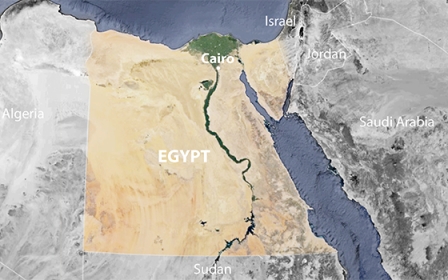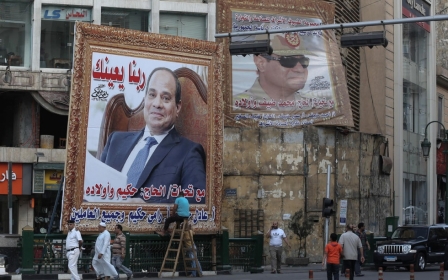Timeline: Egypt's seven presidents

Some 54 million Egyptians are eligible to vote in the two-horse race between former army chief Abdel-Fatah al-Sisi – who led the army last July to oust elected Mohamed Morsi following protests – and leftist candidate Hamdeen Sabbahi, who came third in the 2012 polls that brought Morsi to power.
The following is a review of the seven presidents who have led Egypt over the past six decades:
- Mohamed Naguib (1953-1954)
Naguib was the first president of the newly declared Republic of Egypt for a brief tenure, which ended with his removal from the Egyptian Revolutionary Command Council and subsequent house arrest.
After 30 years of isolation, Naguib passed away on August 28, 1984.
New MEE newsletter: Jerusalem Dispatch
Sign up to get the latest insights and analysis on Israel-Palestine, alongside Turkey Unpacked and other MEE newsletters
- Gamal Abdel-Nasser (1954-1970)
Nasser, who served as deputy prime minister under Naguib's short-lived rule, became president after overthrowing Naguib and ordering him put under house arrest.
Nasser was the de facto president until his officially inauguration following a 1956 referendum.
Nasser died of a heart attack in September 1970.
- Anwar al-Sadat (1970-1981)
Al-Sadat, Nasser's vice president, took power following his predecessor's death, becoming the republic's third president.
He was assassinated on October 6, 1981 during a military parade held to commemorate the eighth anniversary of the October War with Israel, amid a government arrest campaign targeting Islamist leaders.
- Soufi Abu-Taleb (1981)
Abu-Taleb, the republic's first interim president, who had been parliament speaker at the time, was sworn-in according to the 1971 constitution following al-Sadat's assassination.
He stayed in office for only eight days until then-vice president Hosni Mubarak assumed power.
- Hosni Mubarak (1981-2011)
Mubarak was sworn-in following a referendum held after al-Sadat's death. He remained in office until the January 2011 popular uprising, which forced him to delegate executive authority to Egypt's Supreme Council of the Armed Forces, which ran the nation's affairs until Egypt's first-ever free presidential election in 2012.
Mubarak later became the first Egyptian president to ever face trial upon his departure from power. He is currently accused of ordering the killing of hundreds of anti-regime protesters during the 2011 uprising and was recently slapped with three years in jail for corruption.
- Mohamed Morsi (June 30, 2012 – July 3, 2013)
Morsi, who hails from Egypt's Muslim Brotherhood movement, became the country's first civilian president after winning democratic elections in 2012.
He was ousted last July by the army following massive protests against his single year in office.
- Adly Mansour (July 3, 2013 – present)
Mansour, head of Egypt's Supreme Constitutional Court, was installed as president by the army for an interim period following Morsi's ouster.
His term will end with the June 5 announcement of the upcoming president elections results, which ex-army chief al-Sisi is expected to sweep.
Middle East Eye delivers independent and unrivalled coverage and analysis of the Middle East, North Africa and beyond. To learn more about republishing this content and the associated fees, please fill out this form. More about MEE can be found here.





